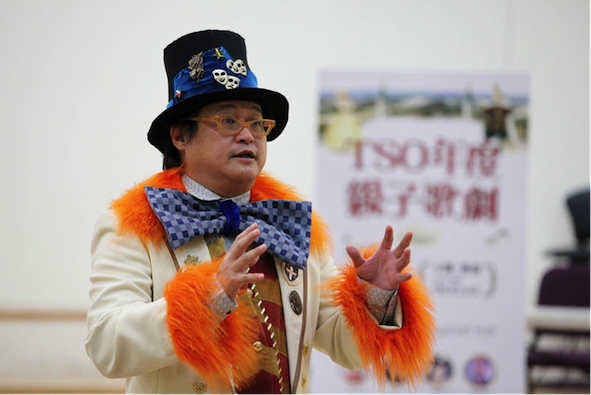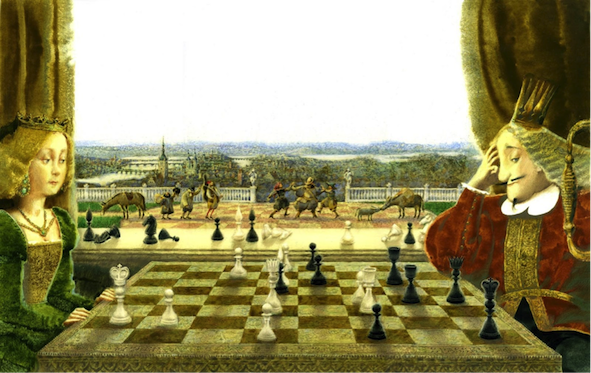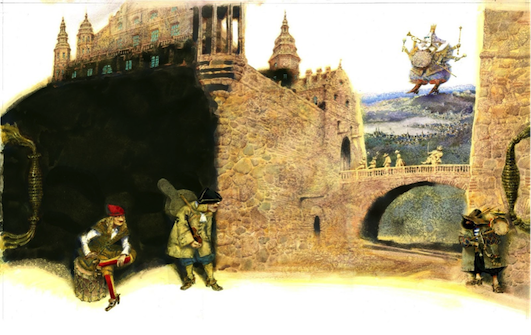Carl Orff’s Die Kluge—TSO’s year-end gift for families
By Leo Maliksi
The Taipei Symphony Orchestra presented its year-end production of Die Kluge, an opera by German theatrical composer Carl Orff, from December 16 to 18 at the Taipei Zhongshan Hall.

Die Kluge translates into English as “the clever one.” Orff was inspired by “The Clever Farmer’s Daughter,” found in Volume One of The Complete Fairy Tales of the Brothers Grimm. It is a story of greed conquered by love and intelligence.
The fairy tale starts with a very poor farmer who has no farm. His clever daughter suggests that he ask the king for a small piece of land. What have they to lose? The king, in a generous mood, decides to give them a field. They set to work growing wheat and fruit, but are astonished to uncover a mortar made of gold just sitting there in the earth.

His unceasing lamentations reach the King, who decides to summon the clever daughter so he can gauge her wisdom for himself. As well as intelligent, she proves to be charming and beautiful. Deciding to marry her, the king sets her father free.
Several years later, the king is asked to mediate on a rather unusual dispute. A farmer’s horse gave birth to a foal who then ran away and lay down among another farmer’s oxen. The first farmer says the foal is his, while the second slyly insists that the foal was found with his oxen, so they must have given birth to it.
Ignoring basic biology, the king decides in favor of the ox farmer. The other farmer is not rich and cannot afford to lose his foal. Remembering that the queen comes from a farming family, he begs her to intercede on his behalf. She agrees, on one condition: the king must never find out she is involved.
On her advice, the farmer spreads fishing nets through the streets, and, inevitably, he is asked what he is doing. The King is outraged when word reaches him of the farmer's answer: "If two oxen can give birth to a foal, well, it must be possible to fish on dry land."

When the King awakens in the farmhouse, the Clever One tells him that, at his word, she has taken for her own what she held most dear in the palace: the King himself. The King realizes the true extent of her cleverness, but she demurs: No one, she says, can be truly clever and in love at the same time. This wins the King over entirely, and the opera ends with their reconciliation.
AN OPERA FOR CHILDREN
When Shu-Si Chen took over as TSO director in March 2016, he vigorously promoted music education for children, organizing a series of performances called the Family Opera at the National Concert Hall and seeking the collaboration of other artists, such as Chao Tzu Chiang, director of the Children’s Theater Group, to promote music education for children.
Chen and Chao had previously worked together for many years promoting children’s theater. When the TSO asked him to help in operatic production, Chao replied that while he liked music and theater, he was not very keen on opera. But Chen finally convinced him to make full use of his talents at helping children to appreciate opera by directing Die Kluge.
Orchestral conductor Paul Lin was just five years old when he started studying the violin. Born in 1973, Lin was associate conductor of the Taiwan National Symphony Orchestra from 1999 to 2006, after which he became the director of the Taipei Philharmonic Orchestra, a position he holds to the present day.
Male baritone Wu Bai Yu-xi played the king. Wu Bai studied music at Fu Hsing Kang College, graduating in 1984. After working with opera masters in Italy and Germany, he won the Opera Association of Bergamo’s “Best Opera Singer” award in 1994. Wu Bai undertook further studies and training at the Milan National Academy of Music, graduating in 1996.
Female soprano Mewas Lin played the farmer’s clever daughter who became queen. Lin and Wu Bai are of Atayal descent. A graduate of National Taiwan University of the Arts, Mewas Lin trained under Masako Takahashi, a famous Japanese soprano, and Shen Xue-gang, a well-known Taiwanese opera singer who in the mid-nineties was director of the former Council for Cultural Affairs (now Ministry of Culture). In 1989, singing at the Weill Recital Hall in New York, Lin launched the start of her outstanding professional career as an opera singer. In February 1993, she sang the “Drinking Song” in Verdi’s La Traviata in a duet with Jose Carreras. She is currently a professor at the Taipei National University of the Arts.

Filmmakers and Icons
The TSO production team translated Die Kluge’s original German dialogue into Chinese and designed costumes and choreography that would appeal to children. World-renowned Byelorussian illustrator Pavel Tatarnikov was commissioned to draw some of the characters from the fairy tale which were then projected on an LED screen as a way of engaging a more digitally minded younger audience.
For TSO Director Chen, Die Kluge is the orchestra’s year-end gift to families, a way of educating the young audience about the qualities of justice and love, and a way to inspire children with a love for opera. Many talented artists, theatrical performers, and producers are very willing to create shows for today’s children, said Chao Tzu Chiang. “We hope that families will come and open this year-end present that we prepared for them.”

![Taiwan.gov.tw [ open a new window]](/images/egov.png)
